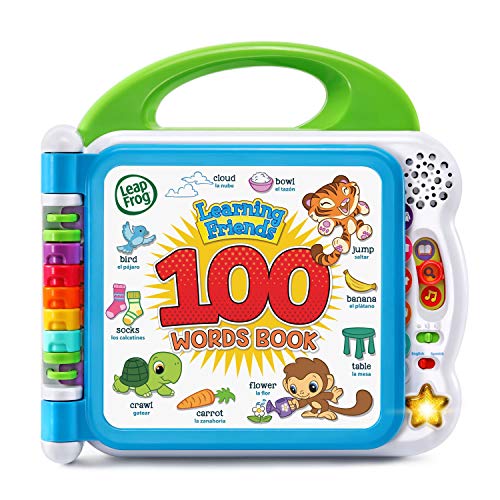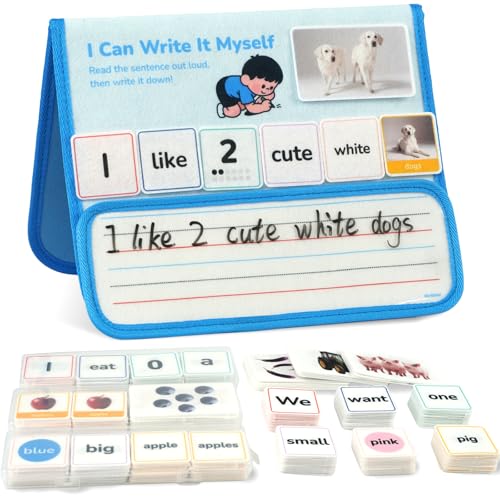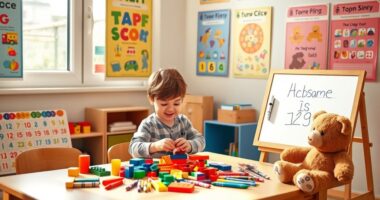Between 18 and 24 months, your child’s language skills rapidly grow. They start combining words into simple sentences, use gestures like pointing and waving to communicate, and their vocabulary expands markedly each day. Basic grammar begins to take shape as they understand how words fit together. Observing their gestures and word use can offer insight into their progress. Keep exploring to discover more about this exciting language milestone.
Key Takeaways
- Children rapidly expand their vocabulary, learning new words daily and beginning to combine them into simple two-word phrases.
- Gesture use, such as pointing and nodding, becomes intentional to communicate needs and support speech development.
- Basic grammar understanding emerges as children start forming simple sentences and recognize sentence structures.
- Engaging in reading, naming objects, and conversations encourages language growth and reinforces learning routines.
- Overall, this period marks a significant milestone in language burst, combining words, gestures, and foundational grammar skills.

Between 18 and 24 months, your child’s language skills often experience a rapid burst of growth known as the “language explosion.” During this period, toddlers start to combine words into simple sentences, expand their vocabulary, and grasp basic grammar rules. It’s an exciting time when you’ll notice your little one communicating more effectively and with greater confidence. One of the key aspects of this stage is gesture development. Your child begins to use gestures intentionally to convey needs, desires, or ideas, even before their speech becomes fully words. Pointing at objects, waving goodbye, or nodding to affirm understanding are common gestures at this age. These gestures serve as a bridge to spoken language, helping your child express themselves when words might still be limited. They also provide insight into what your child is thinking and feeling, offering you clues on how best to respond and support their language journey.
Alongside gesture development, vocabulary growth accelerates dramatically. You’ll find your toddler learning new words daily, often enthusiastic to label familiar objects, people, and actions. Their vocabulary might include simple nouns like “ball” or “dog,” and verbs such as “go” or “eat.” As they gather new words, they often start to use them in combination, creating simple two-word phrases like “more juice” or “big truck.” This is a sign they’re beginning to understand how words work together to form meaning. Encouraging this growth is essential; reading with your child, naming objects around the house, and engaging in conversations help expand their vocabulary. Repetition and consistent exposure are key, as children at this stage learn best through familiar routines and repeated interactions. Additionally, understanding basic grammar rules is developing, which lays an important foundation for more complex language skills in the future.

Laynertoys Montessori Busy Book Color Sorting Toys for Toddlers 3-5, Autism Educational Toys Preschool Learning Activities for Kids, Sensory Fine Motor Matching Games for 3 Year Old Boys Girls Gifts
Color Sorting Busy Book: This Montessori book includes 12 colors、48 charming cartoon stickers、the tough hook-and-loop fastener, You need…
As an affiliate, we earn on qualifying purchases.
As an affiliate, we earn on qualifying purchases.
Frequently Asked Questions
How Can Parents Support Their Child’s Language Development Effectively?
You can support your child’s language development by engaging in play-based learning and incorporating activities like singing and music therapy, which boost vocabulary and communication skills. Talk to them often, describe what you’re doing, and read together daily. Using music therapy can make learning fun and memorable. By actively interacting and encouraging your child’s curiosity, you help them develop language skills naturally and confidently.
What Are Signs of Delayed Language Development in Toddlers?
If you notice your toddler experiencing speech regression or missing key language milestones, it could be a sign of delay. Look for limited vocabulary, difficulty imitating sounds, or not using words consistently. You might also see them struggle to follow simple instructions or not respond to their name. Early intervention is essential, so consult a pediatrician or speech-language pathologist if you’re concerned about these signs.
How Does Bilingualism Affect Language Explosion Timing?
Bilingualism may delay the timing of your child’s language explosion, but it also enriches their communication skills. As they navigate multiple languages, they might engage in code switching and language mixing, which are normal parts of bilingual development. Instead of rushing, support their learning by encouraging both languages, understanding that their language skills will flourish over time, with their unique bilingual journey shaping their linguistic growth.
When Should Parents Seek Professional Help for Speech Delays?
If you notice your child’s speech isn’t developing as expected, especially if they have excessive screen time or limited peer interaction, consider consulting a professional. Seek help if they aren’t saying simple words by 18 months or aren’t combining words by age two. Early intervention can make a big difference, so trust your instincts and reach out to a speech-language pathologist to support their communication growth.
What Are Common Misconceptions About Toddler Language Milestones?
Many parents believe that all toddlers will hit language milestones exactly on time, but that’s a misconception. Some children develop speech skills more slowly, and a speech delay isn’t always a concern. It’s important to remember that every child’s language development is unique. If your toddler isn’t reaching key language milestones by 24 months, consider consulting a professional to guarantee there’s no underlying issue.

LeapFrog Learning Friends 100 Words Book (Frustration Free Packaging), Green
Interact With Friends: Meet learning friends Turtle, Tiger and Monkey who will introduce the alphabet through more than…
As an affiliate, we earn on qualifying purchases.
As an affiliate, we earn on qualifying purchases.
Conclusion
As you watch your toddler’s tiny words bloom into full sentences, it’s like witnessing a garden bursting into vibrant life. Each new word is a colorful flower, and their growing confidence is the warm sun guiding it all. Remember, this explosion is a natural part of their journey, filled with wonder and discovery. Cherish these moments—soon, their voice will fill the air like a joyful chorus, shaping their world with every word they learn.

LENGTOUQ Robots Toy for Kids with Wireless Remote Control and Gesture Sensing, Programmable Walking Singing and Dancing Robots, Easter Gifts Birthday Gifts for Kids Aged 3 4 5 6 7 8 9 Year Old
Remote Control and Gesture Sensing: Fun interactive robot can be controlled by wireless remote control, and can also…
As an affiliate, we earn on qualifying purchases.
As an affiliate, we earn on qualifying purchases.

CHEFAN 165 PCS Sentence Building for Kids, Speech Therapy Materials with Writing Board, Sentence Building Games for Special Education, Reading & Language Development
Multi‑Structure Sentence Building Kit: Kids master language skills through hands-on sentence building with this complete kit. Now with…
As an affiliate, we earn on qualifying purchases.
As an affiliate, we earn on qualifying purchases.









